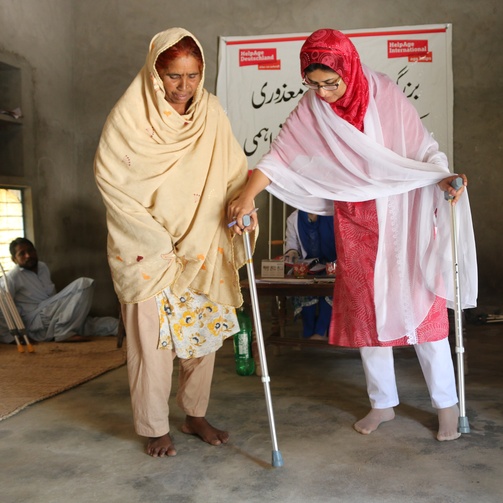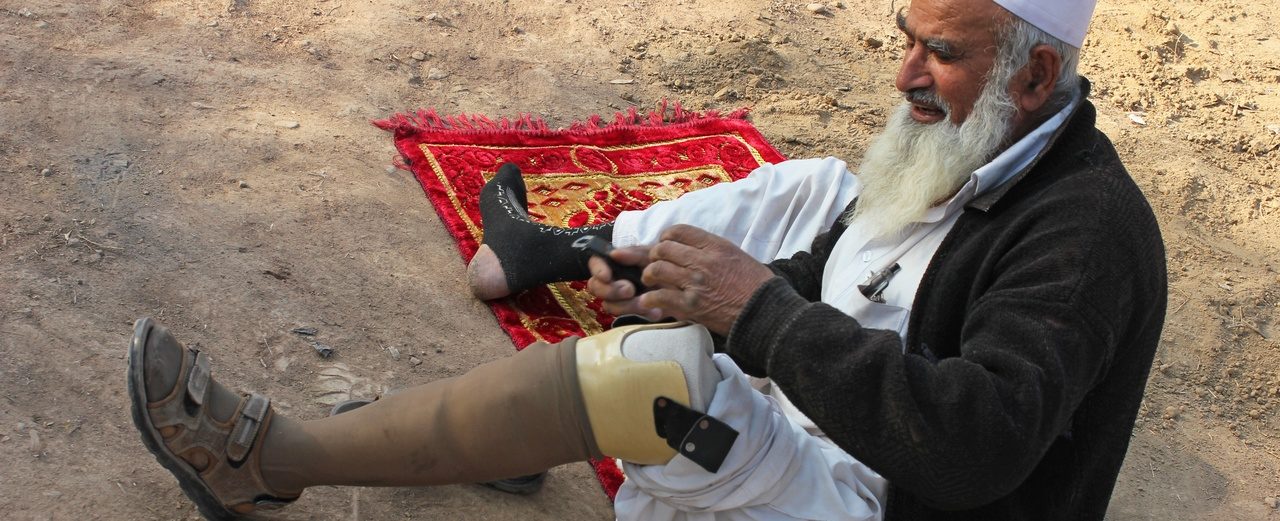 The way back into a self-reliant life
The way back into a self-reliant life
Walking aids for elderly persons in Pakistan
"As a young person you take so much for granted and I never thought about what it would be like to live with a disability," admits Rehman Khan. Today, the 69-year-old has lived through a lot in his life. Born two years after Pakistan was founded, he experienced the ups and downs of the young nation for himself. In old age, however, he lost his leg due to diabetes and with it went a large part of his independence. "I felt bad about being a burden to my family and no longer being able to take care of them and myself independently." Only a leg prosthesis helped him to become active again. "Now I can once again go to the market and the mosque. I can even ride my motorbike now", Rehman says happily.
Necessity
Walking aids and prostheses for the elderly with disabilities in the region of Peshawar.
Activity
Purchase and fitting of walking aids (leg prostheses, walking sticks, wheel chairs) as well as training for the elderly.
Countable effort
Number of prostheses, walking aids and wheel chairs issued to elderly people with disabilities.
Result
The persons can walk again and regain their independence.
Systemic effect
The health of the elderly in Peshawar is improved long-term and the older generation can continue to take an active part in society.
Background
Millions of people in Pakistan live below the poverty line (Human Development Index: 150th of 186 (UNDP 2018)). The situation is particularly difficult for the country's elderly. According to the Global Age Watch Index (HelpAge International, 2018), Pakistan ranks 92nd out of 96, which means that the country is not sufficiently equipped to meet the challenges of demographic changes. Following long military operations, there are around 5.3 million refugees within the country alone (Popp, 2015) – including many elderly people. The older generation is one of the most vulnerable groups and needs better health care. Chronic diseases are the main cause of physical impairments. 85 per cent of people over 70 in Pakistan live with a physical disability (HelpAge International, 2018). Diabetes, chronic respiratory diseases and other conditions can result in insufficient blood flow to the tissues and necrosis. If the blood flow is not stabilised in time, the only option is often amputation. However, in many cases not enough prostheses are provided to help people in their new life situation. Due to their now severely restricted independence, these people are often marginalised socially and economically.
The good deed
Through your good deed today, the health situation of elderly people in the Peshawar region will be improved in the long term. The affected persons receive prostheses in order to be able to pursue their professional activities again, to take care of themselves independently and to be able to take part in society. To this end, HelpAge offers training and further education for medical staff, provides medicines, equipment and prostheses, wheelchairs or walking sticks and at the same time carries out prevention work, e.g. with regard to chronic diseases. The aim is that, particularly in the region of Peshawar, people can spend their old age in dignity and self-determination.

AboutPakistan
Islamabad
190,000,000
5,311
Placed 150 of 189
‘Pakistan’ means “Land of the Pure”.
About the organization and further information
Help Age Deutschland e.V.
Website


Further information and source
- HelpAge International, 2018. Pakistan. Trends in Ageing and Health.
- Ashiq, Uzma; Zada Asad, Amir, 2017. The Rising Old Age Problem in Pakistan. Journal of the Research Society of Pakistan, Islamabad.
- Shazad, Amir; Malik, Liaqat Ali; Hussain, Hamid; Soomro, Suhail Karim, 2016. Causes of Amputation in Pakistani Population. International Journal of Rehabilitation Sciences, Islamabad.
- Popp, 2015. Pakistans wachsende Bevölkerung – Ein Hemmnis für sozialökonomische Entwicklung. Stiftung Wissenschaft und Politik. Deutsches Institut für Internationale Politik und Sicherheit, Berlin.
- Thiel, 2019. Pakistan. Deutsche Gesellschaft für Internationale Zusammenarbeit (GIZ) GmbH.
- Elmer, Christina; Farahani, Donya, 2015. Die Menschheit in 85 Jahren.
- HelpAge International, 2019. Humanitarian Support for Restoring Dignity.




